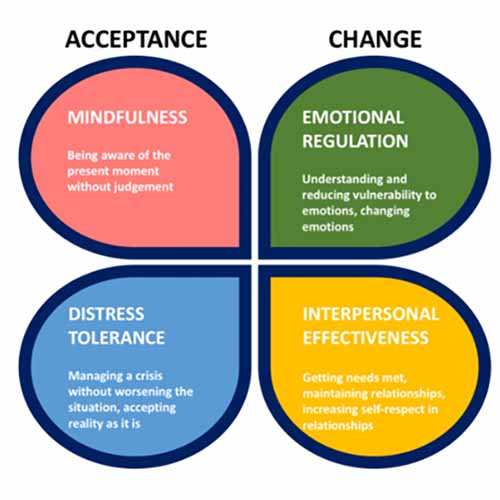Encouraging People Via Reliable Dialectical Behaviour Treatment (DBT) Solutions: Building Stronger Mental Wellness Foundations
In the world of psychological health and wellness, the relevance of empowering individuals through reliable Dialectical Behavior Therapy (DBT) solutions can not be overemphasized. By concentrating on the core concepts of DBT, such as enhancing psychological policy skills, improving social effectiveness, developing distress tolerance strategies, and cultivating mindfulness techniques, people can begin on a journey in the direction of structure stronger psychological wellness foundations.
Recognizing the Core Concepts of DBT


One core concept of DBT is validation. An additional basic element is dialectics, which instructs individuals to check out scenarios from multiple perspectives and discover the synthesis in between conflicting thoughts or feelings.
In addition, the concept of dialectical abstaining is central to DBT. This concept urges individuals to avoid self-destructive actions while likewise accepting themselves. By recognizing and including these core concepts, specialists can successfully implement DBT methods and assistance individuals in their trip in the direction of psychological policy and psychological well-being.
Enhancing Psychological Regulation Abilities
Creating efficiency in handling feelings is a fundamental aspect of promoting emotional health and social effectiveness - DBT London. Enhancing emotional law skills is a core element of Dialectical Behavior Treatment (DBT) that equips individuals with the tools to navigate intense emotions in a positive and healthy way. With DBT, people learn to determine, understand, and regulate their emotions, causing improved psychological health and wellness results
DBT emphasizes the value of mindfulness, which involves existing in the moment without judgment. This method permits individuals to observe their emotions without becoming overwhelmed by them, enhancing their capacity to respond effectively as opposed to respond impulsively. By cultivating mindfulness, individuals can develop a greater feeling of self-awareness and psychological control.
Additionally, DBT teaches useful abilities such as distress tolerance and feeling law strategies to help individuals take care of tough feelings. By learning these abilities, people can decrease impulsive behavior, enhance decision-making, and reinforce their partnerships with others. Ultimately, boosting emotional regulation skills with DBT equips people to lead even more meeting and balanced lives.

Improving Interpersonal Efficiency
Having developed a strong structure in psychological policy abilities within the framework of Dialectical Practices Therapy (DBT), the emphasis now shifts towards enhancing interpersonal efficiency. Improving interpersonal efficiency is a vital part of DBT as it furnishes people with the essential skills to navigate social communications, interact efficiently, set limits, and develop healthier connections.
In DBT, interpersonal effectiveness abilities are shown through components that concentrate on locations such as assertiveness, efficient interaction, and social problem-solving. By finding out these skills, people can enhance their capacity to express their desires and demands, keep self-regard, and build more powerful links with others.
Exercising mindfulness is an indispensable part of enhancing social effectiveness within the DBT framework. Mindfulness enables individuals to be present in their interactions, listen proactively, and respond attentively as opposed to respond impulsively. By including mindfulness right into their every day lives, individuals can grow higher self-awareness and psychological policy, which are important for effective interpersonal communications.
Structure Distress Resistance Strategies
Exploring efficient approaches for taking care of psychological distress is essential for individuals looking for to enhance their coping skills and resilience. Building distress tolerance strategies is a vital element of Dialectical Behaviour Treatment (DBT) that equips people to navigate challenging emotions without coming to be overwhelmed.
In addition, mindfulness practices play a substantial role in structure distress tolerance. Mindfulness urges people to stay present in the moment without judgment, permitting them to observe their ideas and feelings without responding impulsively. This understanding enables people to tolerate distress a lot more successfully and develop a greater feeling of control over their reactions.
Along with these strategies, creating a customized distress resistance strategy with the assistance of a trained specialist can give people with a customized method to managing emotional distress - DBT London. By integrating visit this page these approaches right into day-to-day live, people can strengthen their mental health structures and improve their overall well-being

Cultivating Mindfulness Practices
To grow their distress resistance strategies better, individuals can concentrate on cultivating mindfulness methods as a corresponding method within the structure of Dialectical Practices Therapy (DBT) Mindfulness, a key part of DBT, entails taking note of the here and now moment without judgment. By promoting mindfulness, individuals can boost their recognition of ideas, emotions, and bodily sensations, promoting a deeper understanding of themselves and their experiences.
Mindfulness methods in DBT include techniques such as conscious breathing, body scans, and observing ideas without attachment. These techniques encourage people to develop a non-reactive stance towards their internal experiences, enabling them to react to difficult circumstances with greater quality and calmness. By including mindfulness into everyday regimens, individuals can learn to regulate their emotions better, reduce spontaneous habits, and grow a feeling of inner peace.
Through pop over here cultivating mindfulness practices, people undertaking DBT can develop a strong foundation for taking care of tension, enhancing relationships, and improving total health. By incorporating mindfulness into their restorative trip, individuals can establish useful abilities that equip them to navigate life's difficulties with durability and self-awareness.
Final Thought
In conclusion, efficient Dialectical Practices Treatment (DBT) solutions play a critical duty in empowering people to build more powerful psychological health and wellness structures. By understanding the core concepts of DBT, boosting psychological regulation skills, boosting interpersonal effectiveness, developing distress tolerance techniques, and growing mindfulness practices, people are geared up with the needed tools to navigate their emotions, partnerships, and challenges in a much more adaptive and resilient way. DBT solutions use a detailed method to promoting mental health and empowering people to lead satisfying lives.
By concentrating on the core principles of DBT, such as boosting psychological law skills, boosting social performance, building distress tolerance techniques, and growing mindfulness practices, people can get started on a trip towards building stronger mental wellness foundations. Enhancing psychological law abilities is a core component of Dialectical Behaviour Treatment (DBT) that furnishes people with the tools to browse intense feelings in a constructive and healthy fashion.Additionally, DBT teaches useful abilities such as distress resistance and emotion regulation methods to her latest blog assist individuals handle tough feelings.To strengthen their distress resistance strategies better, people can focus on cultivating mindfulness practices as a corresponding approach within the structure of Dialectical Behavior Treatment (DBT) By understanding the core principles of DBT, enhancing emotional guideline abilities, enhancing interpersonal efficiency, constructing distress tolerance techniques, and growing mindfulness methods, people are outfitted with the needed tools to browse their emotions, connections, and difficulties in an extra resistant and flexible fashion.
Comments on “DBT London: Leading You Towards Emotional Well-being and Stability”